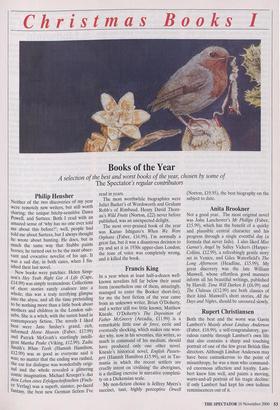Christmas Books I
Books of the Year
A selection of the best and worst books of the year, chosen by some of The Spectator's regular contributors
Philip Hensher
Neither of the two discoveries of my year were remotely new writers, but still worth sharing; the unique bitchy-sensitive Dawn Powell, and Surtees. Both I read with an amazed sense of 'why has no one ever told me about this before?'; well, people had told me about Surtees, but I always thought he wrote about hunting. He does, but in much the same way that Stubbs paints horses; he turned out to be the most obser- vant and evocative novelist of his age. It was a sad day, in both cases, when I fm- 'shed their last novel.
New books were patchier. Helen Simp- son's Hey Yeah Right Get A Life (Cape, £14.99) was simply tremendous. Collections of short stories rarely coalesce into a whole; this was a truly terrifying glimpse into the abyss, and all the time pretending to be nothing more than a little book about mothers and children in the London sub- urbs. She is a witch, with the surest hand in Contemporary fiction. The novels I liked best were Jane Smiley's grand, rich, informed Horse Heaven (Faber, £17.99) and Patrick McGrath's startlingly intelli- gent Martha Peake (Viking, £12.99). Zadie Smith's White Teeth (Hamish Hamilton, £12.99) was as good as everyone said it Was; no matter that the ending was rushed, the ear for dialogue was wonderfully origi- nal and the whole revealed a glittering comic imagination. Michael Krueger's Aus clan Leben eines Eifolgsschriftstellets (Fisch- er Verlag) was a superb, sinister, po-faced fantasy, the best new German fiction I've read in years.
The most worthwhile biographies were Juliet Barker's of Wordsworth and Graham Robb's of Rimbaud. Henry David Thore- au's Wild Fruits (Norton, £22) never before published, was an unexpected delight. The most over-praised book of the year was Kazuo Ishiguro's When We Were Orphans (Faber, £16.99). I'm normally a great fan, but it was a disastrous decision to try and set it in 1930s upper-class London; the tone of voice was completely wrong, and it killed the book.


































































































 Previous page
Previous page